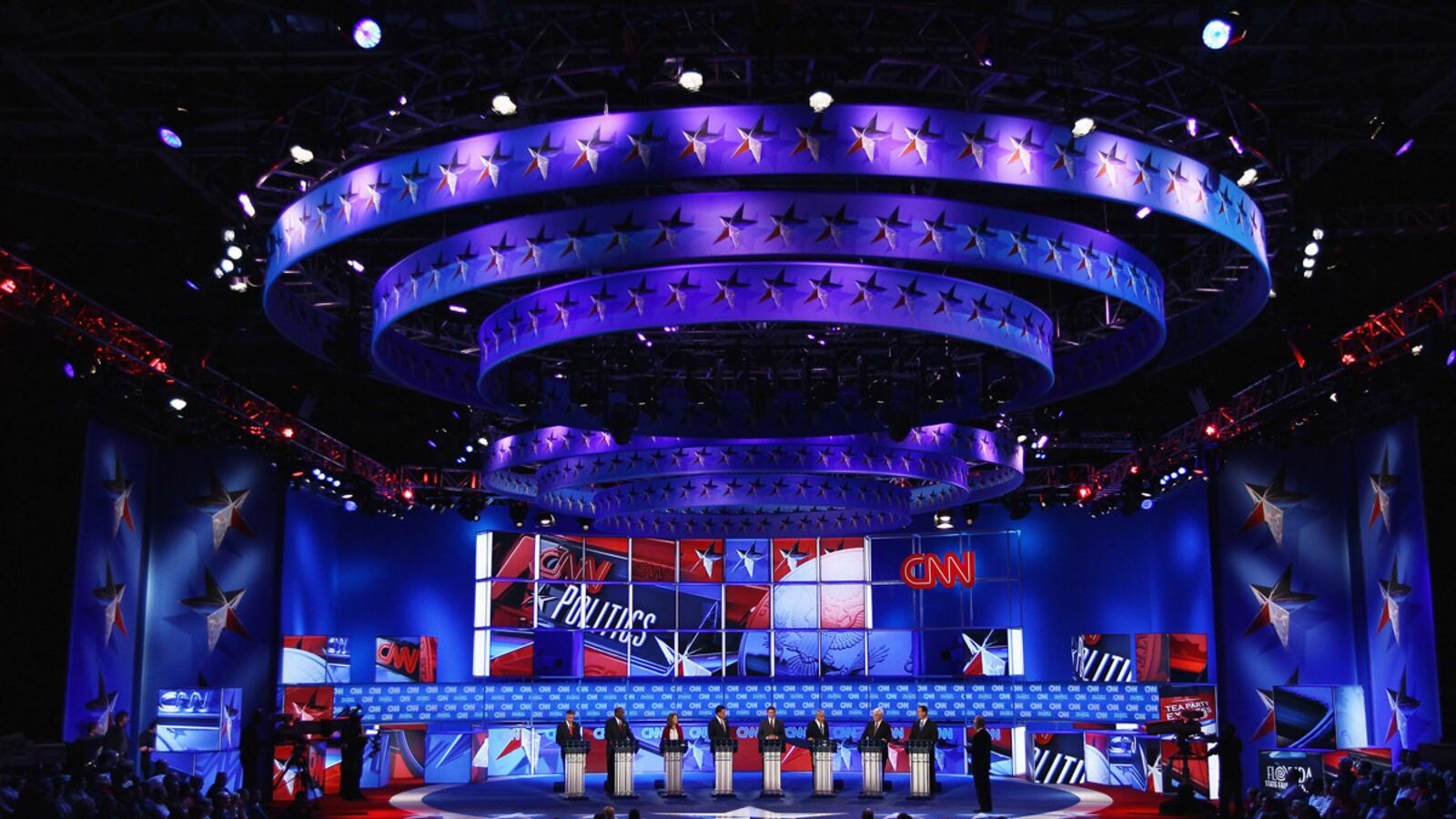Two years ago, the Tea Party movement rocketed to prominence as a spontaneous, grassroots, collective middle finger to the political establishment of both parties after an orgy of Washington bailouts, pork spending, and ballooning federal budgets.
Suddenly, thousands of stay-at-home moms and guys in golf shirts were organizing protests, lobbying Congress, and shaping the national agenda, all from their basements and kitchen tables.
Now the Tea Party Express, one of hundreds of the motley crew of activist groups from across the country, has partnered with CNN to sponsor a splashy, highly choreographed presidential debate for the eight top Republicans seeking to knock off Barack Obama in 2012. That event Monday night has got to be a watershed moment for a movement once treated with open skepticism by the mainstream media. And that’s not all: elsewhere, local Tea Parties have hired PR firms, launched PACs, and created sophisticated campaigns to advance their issues at every level of government.
With production values as high as a Spielberg movie and payrolls reminiscent of a national political party, the Tea Party movement is now in danger of looking like it’s gone Hollywood, becoming the establishment political force it promised to bring down in 2009.
“Mrs. Fields had a good thing going until she put it on supermarket shelves,” says Pat Griffin, a longtime GOP strategist and senior fellow at the New Hampshire Institute of Politics at Saint Anselm College. “They’ve got to be very careful to protect the genuineness of their brand.”

But if Monday’s debate in Tampa makes the movement look like a monolithic party, the wildly mixed reaction to the evening from Tea Party activists around the country proves that it is anything but.
“I don’t think [the Tea Party Express] represents the movement at large,” Mark Meckler, cofounder of the Tea Party Patriots, says of the cosponsoring group of the CNN debate. “I think that the people who watch debates will be watching tonight. Is it a big event among Tea Party activists? I’d say no.”
Atlanta-based Meckler contends that the Tea Party Express is nothing more than a GOP-aligned PAC run by California-based Republican consultant Sal Russo.
The Ohio Liberty Council is listed as a cosponsor of the CNN debate, but Ray Warrick, one of the group’s leaders, says it has no relationship to the Tea Party Express.
“I don’t know who the Tea Party Express is. I just know here in Ohio we are still a small little fractious group,” he says. “We’re asking a question at tonight’s debate, but that doesn’t mean that we’re taking instructions from any group—we’re just happy to participate.”
For his part, Russo has said he makes “zero profit” from working for the group and defends the Tea Party Express as helping the movement by working through power, not against it. "We believe in changing through the political process," he has told the Los Angeles Times. Meckler and Warrick may not claim the Tea Party Express, but Meckler welcomes the suggestion that the Tea Party movement is now a mainstream force and says the fact that nearly every Republican candidate craves the Tea Party’s blessing proves their message is anything but fringe.“Sixty-one percent of Americans say they agree with Tea Party values. I think that makes it mainstream,” Meckler says. “The entire national debate now revolves around Tea Party principles.”The CNN debate seemed to prove Meckler’s point, as activists from across the country grilled the candidates with questions that included a handful of sideshow topics like the Federal Reserve, but mostly focused on everyday Americans’ struggles.“What is your plan to balance the budget and get spending under control so that my children’s share of the debt is erased without compromising my retired mother’s already tenuous financial future?” Bridget Nelson from the Pleasonton Tea Party said.Tyler Hensley of the Napa Tea Party Teens stumped more than a few candidates when he asked, “Of every dollar that I earn, how much do you think I deserve to keep?”And Theodore Wendler of the First Coast Tea Party asked the question that even the best GOP strategists are still struggling with: “How will you convince senior citizens that Social Security needs to be changed and get their vote?”
Pat Griffin stops short of calling the movement “mainstream,” but he says the groups have earned a place at the table with the energy and passion they have demonstrated since 2009.
“Every single candidate from the Republican side of this thing, with the possible exception of Jon Huntsman, has had to reach out to appeal to the Tea Party,” he says. “They will be an important part of the Republican base.”
And while most of the movement is still far from being a professional operation, local activists say they see the value in getting professional help to compete with the big money forces in the political game.
Like many Tea Party groups, the Ohio Liberty Council is now raising money and recently hired a campaign manager to fight health-care reform at the state level. “We are still very much grassroots,” says Ray Warrick. “But we understand and support the need to do traditional things to influence decisions in our favor.”





